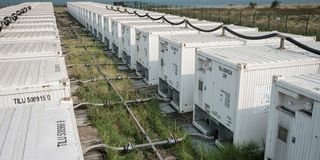Prime
Lifting lid on ‘contentious’ GCC-McDermott contract

Crude oil containers in Bullisa District. GCC Services, which is majority owned by a Dubai-based was sub-contracted to offer camp and catering services. PHOTO | FILE
What you need to know:
- Whereas it is claimed that GCC Services should not be contracted as a local company, Petroleum Authority of Uganda says it qualifies for contracts that are ring-fenced for Ugandan companies.
The award of an oil contract to GCC Services, a local company but with a majority stake owned by a foreign company based in UAE to provide camp and catering services for the Tilenga oil upstream facilities project has risen questions.
The contract awarded by McDermott, the main contractor of the Tilenga project, is meant to offer camp and catering services to an international and local workforce expected to peak at 3,500 workers over the next six years.
The questions are premised on why a company that is majority owned by a foreign firm should be hired to provide services, yet the same belongs to the ring-fenced category for Ugandan companies only.
In fact, Cedric Babu Ndilima, a Ugandan entrepreneur, recently questioned why the contract did not go to a local company and, “if need be, it could bring in GCC to strengthen its bid to reduce capital flight and build local capacity.”
About GCC Services
Until recently, little was known about GCC Services.
According to its website, GCC describes itself as a Dubai-based company, offering integrated remote site services, among which include catering, camp management, construction, logistics and supply chain services.
In a statement recently Rashad Sinokrot, the GCC chief executive officer, said the company has been operating in Uganda since 2010, which, therefore, gives it a strong foundation with a proper understanding of the Uganda market.
“We understand the importance of this project to Ugandans and their future,” he said, noting that GCC’s local presence, international footprint and record of performance on critical energy projects were defining elements that had worn it the bid. GCC, Sinokrot said, is planning “significant local engagement” that will include training and upskilling of the local workforce, as well as support and develop local vendors and suppliers, including farmers.
Local presence
Whereas some people view it as a foreign company, Aggrey Ashaba, one the local shareholders, insist GCC is a Ugandan company with a blend of foreign ownership.
GCC, he said, holds a controlling stake of 52 percent under Gulf life support services, while the remainder of 48 percent stake is held by Ugandans.
Just like Sinokrot, Ashaba says, GCC has been operating in Uganda since 2011 and has worked on a number of projects with large oil sector players such as Total and CNOOC.
Its local presence is further emphasised by the Uganda National Oil Suppliers’ database, which lists it as a locally registered entity. The company, the database shows, was registered as GCC Services Uganda in 2011.
Its main shareholders include Gulf Life Support Services, Wesley Musinga, Aggrey Ashaba and Andrew Lutwama. It is also listed on the National Supplier Database under the Petroleum Authority of Uganda, which qualifies it to supply services to the oil and gas sector.
However, its description as a Ugandan company on the database remains pending.
But Betty Namubiru, the Petroleum Authority of Uganda national content manager, says an update is ongoing for the National Supplier Database to fix the status of all pending descriptions.
Companies that supply goods and services in oil and gas sector, are by law classified.
A Ugandan company is one incorporated under the Companies Act 2012 and which provides value addition to Uganda, uses available local raw materials, employs at least 70 percent Ugandans, and, approved by the Petroleum Authority of Uganda.
Other requirements includes employing 30 percent of Ugandans in senior positions, about 60 percent in technical positions and 100 percent in brown collar jobs, with resident offices in Uganda.
Problematic
What makes GCC’s situation problematic is, it is majority owned by a foreign company, yet it offers catering and facilities management services, which are legally ring fenced Ugandans companies.
But according to Namubiru, GCC is recognized as a Ugandan company based on its value addition and not ownership.
For as high as 4,000 workers expected in the camp, Namubiru says, the opportunity lies in the supplies for other local suppliers that will work with GCC to meet required demand for the supply of food.
READ MORE: Next development phase of oil sector




